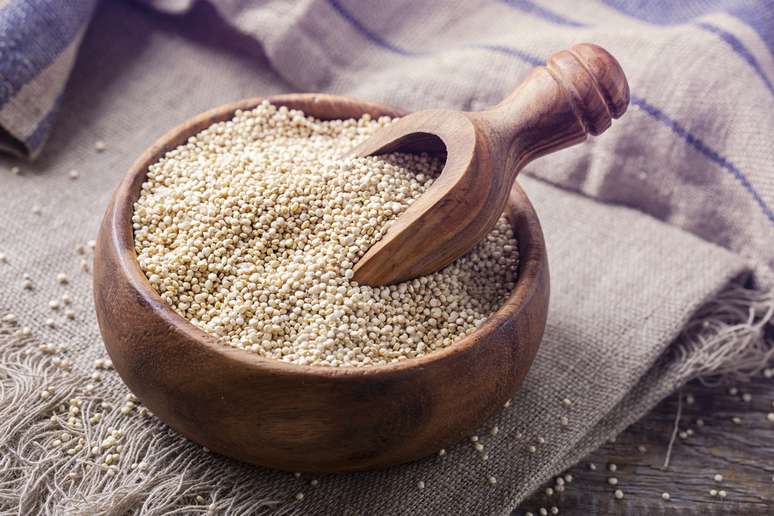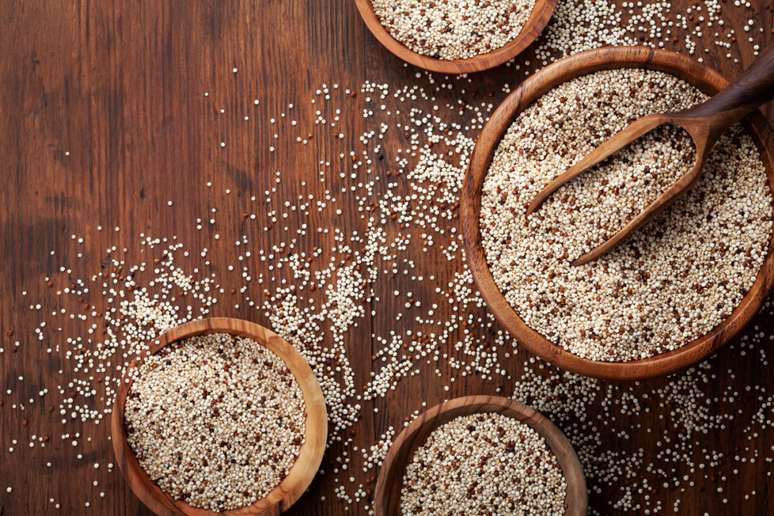Find good reasons to include this food in your diet and keep your body healthier
Quinoa is a versatile food and a great option for anyone who wants to have a complete diet. Because it is rich in fiber, vitamins and proteins, it promotes weight loss and offers many benefits to the body. As nutritionist Queila Turchetto explains, quinoa contains 23 percent protein and a large amount of vitamins, such as B1, B2, B3, B6, C, and E. It’s also rich in minerals, such as iron, phosphorus, and calcium. Furthermore, its consumption helps maintain satiety, being an excellent source of beneficial fats, such as omega 3 and 6.
So, check out the 10 Health Benefits of Quinoa!
1. High nutritional value
Quinoa is a complete protein source, which means it contains all the essential amino acids our bodies need. In addition, it is rich in B vitamins, Vitamin E, minerals such as iron, magnesium and zinc, as well as dietary fiber. This combination of nutrients is essential for maintaining good health.
2. Blood sugar control
The richness of fiber present in quinoa plays a fundamental role in regulating blood sugar levels. By slowing down the digestion and absorption of carbohydrates, fiber helps prevent sudden spikes in blood glucose. Not only is it beneficial for diabetics, but it also helps prevent the development of type 2 diabetes by providing a more stable energy balance throughout the day.
3. Healthy digestion
With its concentration of soluble and insoluble fiber, quinoa is an effective ally for digestive health. The fibers help in the formation of regular stools, preventing Coldand promote the growth of beneficial bacteria in the gut, promoting a healthy and balanced intestinal environment.
“The fibers present in food help keep the body in balance. They absorb excesses and help eliminate toxins. They prevent constipation and diseases related to the intestine,” explains nutritionist Fernanda Sobral.
4. Cardiovascular health
Quinoa contributes to heart health in several ways. Its healthy fat content, such as omega 3 fatty acids and linoleic acid, helps lower bad cholesterol (LDL) and promotes arterial health. Plus, its abundance of antioxidants helps fight oxidative stress and inflammation, factors associated with heart disease.
5. Supply of antioxidants
Quinoa is rich in antioxidants such as vitamin E and flavonoids, which play a key role in protecting cells from damage caused by free radicals. These compounds help reduce oxidative stress in the body, which is associated with premature aging and the development of chronic diseases such as cancer and cardiovascular disease.
6. Weight control
The fiber and protein in quinoa work together to promote a long-lasting feeling of fullness. satiety. By slowing digestion and keeping your stomach full for longer, quinoa can help manage your appetite and control your weight, while preventing unwanted overeating.
“Because they are very fibrous foods, they slow down the absorption of a meal, which is good, since they reduce appetite and the release of hormones that make us fat,” says nutritionist Fernando Castro.
7. Immune system support
With a variety of vitamins and minerals such as zinc, selenium and vitamin C, quinoa strengthens the immune system, helping to protect against infection and disease. These nutrients play a crucial role in the function of white blood cells and proper immune response of the body.

8. Bone health
Quinoa is a significant source of minerals essential for bone health, including magnesium, phosphorus and calcium. These nutrients play a crucial role in the formation and maintenance of bone density.
“[A quinoa] it is effective in the prevention of chronic diseases, such as osteoporosis, heart disease and other female alterations resulting from the lack of estrogen in menopause,” says nutritionist Queila Turchetto.
9. Brain health
the fatty acids Omega 3 present in quinoa are known for their benefits for the brain and cognitive functions. These healthy fats help maintain the integrity of brain cell membranes and may play a role in preventing age-related cognitive decline.
10. Muscle development
Quinoa is an excellent source of complete protein, making it a valuable choice for those looking to build and maintain muscle mass. The essential amino acids found in quinoa are essential for protein synthesis, supporting recovery processes and muscle growth after exercise.
“[A quinoa] it is high in protein, a source of B vitamins, fiber and mineral salts. The quality of the proteins it possesses is comparable to animal sources, not for the quantity, but for the union of different types of proteins that offer everything the body needs,” concludes the culinary Guta Pudell.
Source: Terra
Rose James is a Gossipify movie and series reviewer known for her in-depth analysis and unique perspective on the latest releases. With a background in film studies, she provides engaging and informative reviews, and keeps readers up to date with industry trends and emerging talents.







